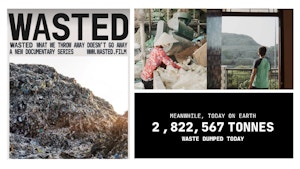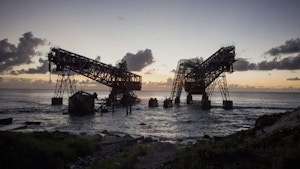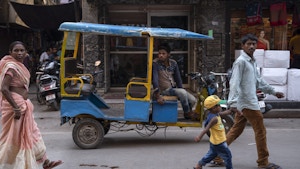India Berita

Polisi & Kewangan
As India votes, young workers hope for jobs and better pay
Unemployment is voters' top election concern - especially among young Indians who are struggling to find skilled, permanent jobs.

The sustainability-focused publication came up tops among competitors in the small and medium media category for 'Best Newsletter' at the awards ceremony held in Kuala Lumpur, Malaysia.

India's six-week-long general election has started, but with more heatwave days than usual forecast, is the nation prepared?

Solar farms in the ocean could generate clean energy on a vast scale, but there are difficult waters to navigate first.
Makanan & Pertanian
Recipes for sustainable food systems
India Pendapat

India’s Indigenous Prototype Fast Breeder Nuclear Reactor (PFBR) and abundant thorium reserves hold key to India’s future energy security.

China’s decision to ramp up spending could accelerate a shift and help achieve long-term climate goals by bringing forward the peak in fossil-fuel use and lowering greenhouse gas emissions.

Long a source of tension with its neighbours, China’s transboundary rivers are opening opportunities for regional cooperation.

Across the globe, political campaigns are targeting young people for their votes, but are they listening to their growing anger over climate inaction?
Karbon & Cuaca
This election year, let’s talk climate
Polisi & Kewangan
How a man's world systematically neglects women
Polisi & Kewangan
How technology can help save Indigenous forests – and our planet
India Video

Launched as policymakers lock horns with petrochemicals lobbyists over a treaty to end plastic pollution, the documentary produced by Eco-Business asks why opportunities to solve humanity's waste crisis are being wasted. It will premiere in Singapore and screen on the sidelines of the upcoming COP28 climate summit.

Studio EB
There are vast mineral riches lying on the ocean floor that could help to power the energy transition, but is the environmental cost of extracting them worth the risk?

Karbon & Cuaca
Eco-Business releases Arctic Awakening
Produced and directed by Eco-Business managing editor Jessica Cheam and video journalist Fraser Morton, who journeyed to Norway earlier this year, the documentary has played to thousands of visitors at Marina Bay Sands’ ArtScience museum since its premiere on 4 October.

Pengangkutan
A social venture on the road to improve lives, reduce emissions with electric rickshaws
With a vision to end the drudgery of manual rickshaw pulling, social enterprise SMV Green is also helping restore clean air in one of India's most polluted cities through electric rickshaws.
India Audio

Polisi & Kewangan
How did Covid change sustainability events?
Studio EB
Covid-19 didn't kill events, but it did change them. Teymoor Nabili and Veemal Gungadin tell the Eco-Business Podcast how a pandemic transformed the way sustainability events are conceived and organised.

"We have a choice about the speed of sea-level rise." The Eco-Business Podcast talks to climate scientist Professor Ben Horton about how close the world is to reaching crucial climate tipping points, and what can be done to stop runaway climate change.

Climate change is causing sea levels to rise at an alarming rate, and nowhere is more at risk than archipelagic Southeast Asia. Climate scientist Professor Benjamin Horton of the Earth Observatory of Singapore tells the Eco-Business Podcast about the risks of rising waters and what can be done to address the problem.
India Siaran Akhbar

United Nations Environment Programme
New initiative aims to curb the toxic impacts of agriculture

Asian Development Bank (ADB)
Developing Asia’s 2023 growth outlook upgraded to 4.9 per cent: ADB

United Nations Economic and Social Commission for Asia and the Pacific (ESCAP)
UN forum opens with a resounding call to accelerate SDG action in South Asia
India Penyelidikan

Eco-Business & Regional Project Energy Security and Climate Change Asia-Pacific of the KAS
The value of biodiversity for Asia's megacities

Centre for Asian Philanthropy and Society (CAPS)
Public-private partnerships for social good

SolAbility - Sustainable Intelligence
The Global Sustainable Competitiveness Index 2019
















